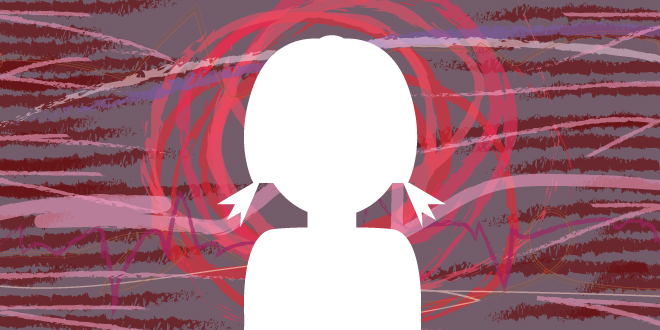Navigating Election Season as a Sexual Assault Survivor

Illustration by Kitty Hu.
“Can we just turn it off?”
That’s what I want to say.
It has been a good day—a day full of belly laughter and wholesome snacks and challenging conversations and life-giving friendships. A day where you learn and grow and flourish. A day like this, I think to myself, should culminate in a good thing. And so I try to imagine myself somewhere pleasant: a beach, perhaps, or maybe the couch in my childhood home. Somewhere warm and comfortable. Somewhere other than where I am.
Where I am is: piled with six other women atop my roommate’s bed, huddled over a laptop with a screen too bright to fit the occasion, watching the latest presidential debate unfold.
The candidates’ arguments are punctuated by comments from my frustrated peers. They listen intently and offer up occasional angry exclamations, as if doing so will allow them to spit out some of the bitterness they are being forced to swallow. My friends, with their exasperated sighs and sarcastic snapchat stories, are trying their best to cope with it all: the micro- and macro-aggressions that characterize Donald Trump’s rhetoric; the erasures and attacks that fill his speeches; the possibility of an America that will continue to villainize its victims.
(If you’re still unsure about Trump’s misogyny, racism, and sexism, you can find more information here, here, and here.)
In the face of fear — for their female bodies, for their colored bodies, for their country — most of my friends become large and loud. They become swollen with fury, ready to demand justice and fight for their rights.
Meanwhile, I become silent. I awkwardly crack my knuckles. I concentrate on breathing. I slump my shoulders, hoping to become smaller. I, like my friends, am furious about the words emerging from Donald Trump’s mouth. I am angry about his dehumanization of black Americans; I am angry about his half-hearted apologies; I am angry that he is tolerated and taken seriously. But rather than growing hot with my anger, I become quiet, because I am preoccupied by another emotion that demands my attention: anxiety.
Or, more specifically, anxiety stemming from the constant anticipation of being triggered.
As a survivor of emotional abuse and sexual assault, I cannot fully engage with the current presidential race. Don’t get me wrong: I desperately want to listen closely, to think carefully, and to speak critically. I want to exercise my right (what some might call my duty) to activate my agency and engage in the political process. But despite my desire to pay attention to Donald Trump’s platforms and examine his arguments, I find myself constantly distracted by anxiety; constantly bracing myself for his next “offhand” or “brash” remark about women; constantly wondering when I will be triggered next. Tuning fully into Trump’s rhetoric is, simply put, detrimental to my mental and emotional health as a survivor.
Recently, tapes of Donald Trump making vulgar claims about women have drawn immense media attention. I won’t do Trump the service of giving his words any more space than they have already taken up, but more information can be found here.
Let’s not mince words. Donald Trump is condoning, advocating, and laughing at sexual assault. He is laughing at the scars etched by abusive partners. He is laughing at the Stanford rape victim. He is laughing in the face of despair and depression.
We cannot ignore it. We cannot tolerate it. We must stop it.
But I am tired. Not the kind of tired that sweetly draws your eyelids closed after a day at the beach. Not even the kind of tired that comes after an exam or a break-up or an awkward phone call. This election season, I am the kind of tired that makes my bones feel as if the marrow has been scraped out of them; the kind of tired that bleaches away my resolve to fight.
Make no mistake: hearing Donald Trump’s rhetoric on women makes me angry. But although I am filled with fury, every second it becomes harder to keep my fists up. As a woman, Donald Trump’s rhetoric is infuriating — but as a sexual assault survivor, it is wholly exhausting.
Imagine running a marathon with cinder blocks strapped to your feet. That is what it’s like to be an assault survivor who must constantly swallow Trump’s words, and shoulder against his triggering remarks, and write yet another gently confrontational response to an acquaintance’s problematic Facebook post. When I engage with Trump’s speeches and slurs, I sign up to fight a mental battle while constantly and consistently being triggered; essentially, I sign up to run a marathon with cinder blocks strapped to my feet.
I don’t exactly know what the solution to this ailment is, or if a solution does exist. Though I so often encourage my friends and colleagues to step back from triggering situations and prioritize their mental health and emotional well-being, I for some reason cannot bring myself to do the same. Maybe it’s a matter of pride or guilt; maybe it’s simply a side effect of being human.
But I think what’s really happening here is that as an assault and abuse survivor, I am tired, but more than being tired, I am determined to do everything in my power to ensure that our nation is not led by an individual who justifies, excuses, and normalizes the invasion of our bodies and erasure of our humanities.
So though I want to, I do not say: “Can we just turn it off?”
Instead, I sit silently in the company of my friends, worried about the nation’s future but encouraged by the fact that I am part of a community that refuses to remain passive. I am grateful for the individuals who inspire me to pursue justice and who join me on the front lines of battle, but I am also grateful for those who assure me that doing what I can — sharing my story, casting my ballot, prioritizing my emotional and mental health — is a form of action in its own right.
Years ago, my humanity was stolen and shredded by a man who, like Donald Trump, did not regard or respect me as a human being. Like many victims of abuse, I internalized my abuser’s narrative, deeming myself weak and unworthy of grace. It has taken an immense amount of effort to unlearn these ideas — and so this election season, I am working hard to find a balance. I will continue to problematize Donald Trump’s rhetoric. I will continue to fight for the freedom of my brothers and sisters. I will continue to reclaim my body and my voice. But I will do so with an awareness of my traumas, an acceptance of my need to rest, and an understanding that stepping back every now and again does not make me weak or unworthy.
This election season, I will act with the understanding that the political is personal and the personal is political. I will trust my friends, colleagues, and comrades to represent me when I become weary. I will enter into political conversations with humility. I will acknowledge that survival and restoration are ongoing processes; I will combat Donald Trump’s narrative of female worthlessness by acknowledging my wounds and tending to my own well-being.
And all the while, I will rejoice in the solidarity of a community — a community of survivors, allies and advocates, of friends and family, of people I have never met who nonetheless battle for my well-being as a survivor — that continues to march forward, even when I must pause.




